The Tar Heel State's Trusted Dredging Specialists
Lake & Pond Dredging Services in Greensboro, North Carolina
As part of the Triad and Central North region, we specialize in restoring older lakes and legacy ponds around Greensboro, addressing sediment from feeder creeks, farmland runoff, and storm events in the Yadkin–Pee Dee watershed—improving depth, water clarity, and longevity for High Rock Lake, Badin Lake, Tuckertown, Tillery, Belews Lake, and community waterways.
Why Choose Us for Greensboro Dredging Projects?
Proven expertise in Triad & Central North's unique waterway challenges
-
🌊 Yadkin–Pee Dee Lake & Pond Expertise
Deep knowledge of sedimentation patterns from feeder creeks, farm runoff, and stormwater inflow on High Rock, Badin, Tuckertown, and Tillery—tailored for Greensboro's legacy lakefront communities and aging infrastructure.
-
🔄 Legacy Pond & Aging Lake Restoration
Revitalizing decades-old ponds and lakes in Greensboro that have lost depth due to long-term accumulation, extending usability for recreation, fishing, and community enjoyment.
-
🏞️ Municipal & Community Waterway Support
Serving parks, city-owned lakes, and public fishing/recreation areas near Greensboro with practical dredging that enhances public access and maintains municipal water resources.
-
💧 Water Quality Improvement & Algae Reduction
Enhancing clarity, flow, shoreline stability, fish habitat, and recreational value in Greensboro waterways by removing nutrient-rich sediment and organic buildup.
-
🌿 Feeder Creek & Storm Sediment Removal
Specialized techniques to dredge sediment deltas at creek inlets and post-storm deposits, restoring natural flow and preventing further erosion around Greensboro.
-
🚜 Flexible Equipment for Tight or Rural Access
Adapting to rural properties, older dam structures, and limited shoreline access in Greensboro, ensuring efficient projects for farm ponds and legacy developments.
Expert Lake Dredging & Water Quality Services in Greensboro, North Carolina
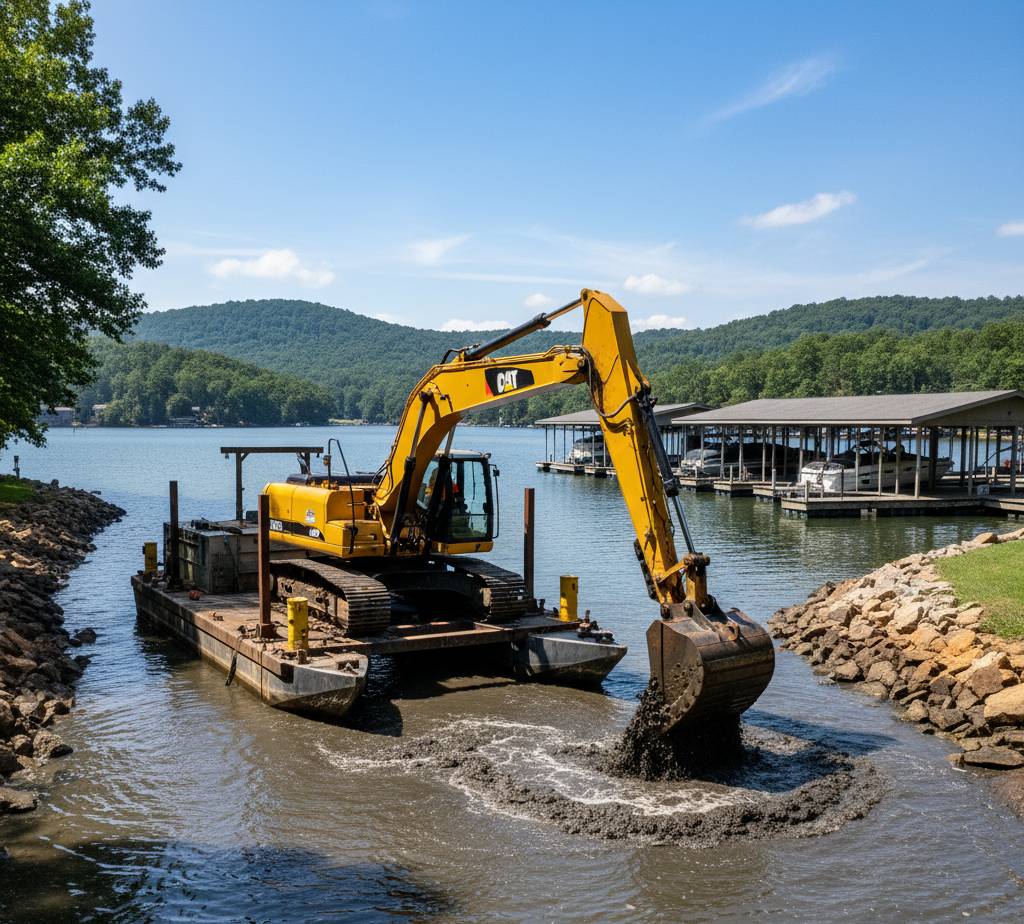
Professional Mechanical Dredging
Lake Norman dock/channel cutting, mountain cove excavation (Fontana/Nantahala), tight HOA access in Wake/Union counties—ideal for near-shore silt removal, muck removal, and targeted lake desilting at docks, ramps, and tight coves across North Carolina.
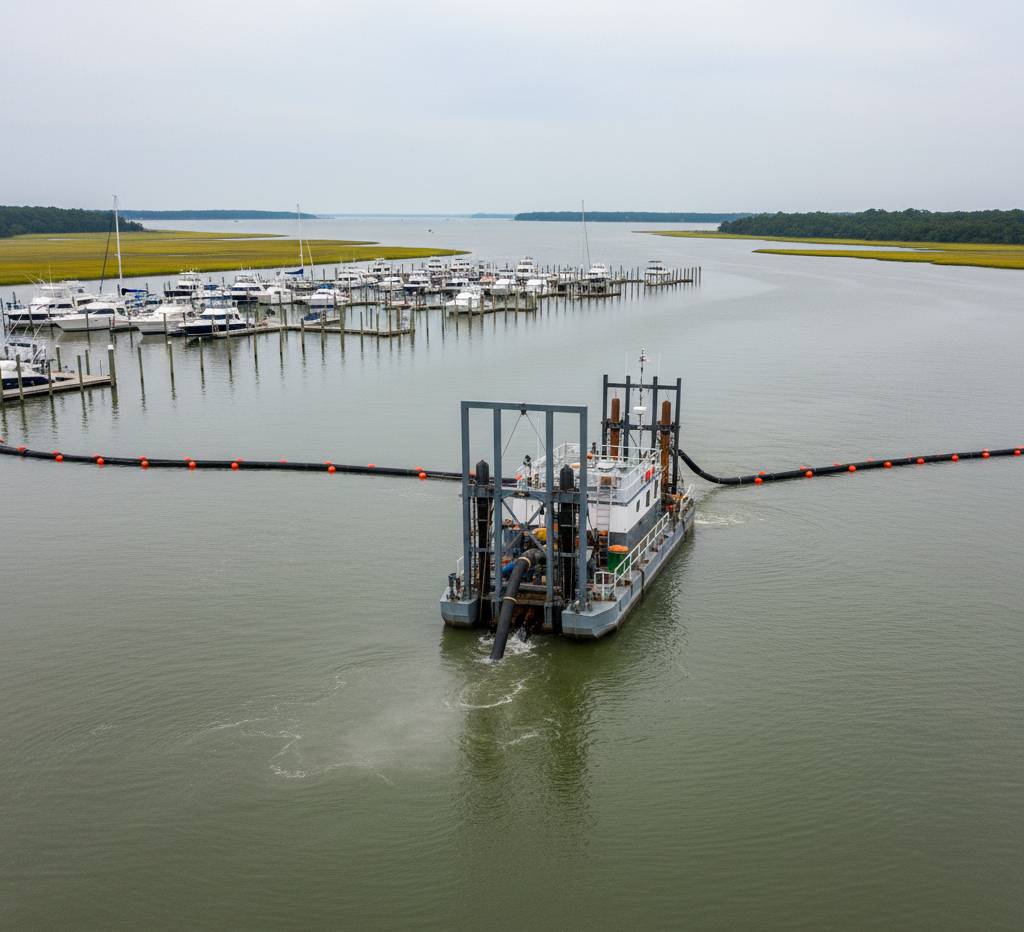
Hydraulic Sediment Removal
Large footprint marinas (Wilmington ICW side canals, New Bern on the Neuse/Trent), fine silt removal (Falls Lake tributary deltas, Tar–Pamlico)—continuous pumping out sediment for longer reaches and sensitive frontage in North Carolina lakes.
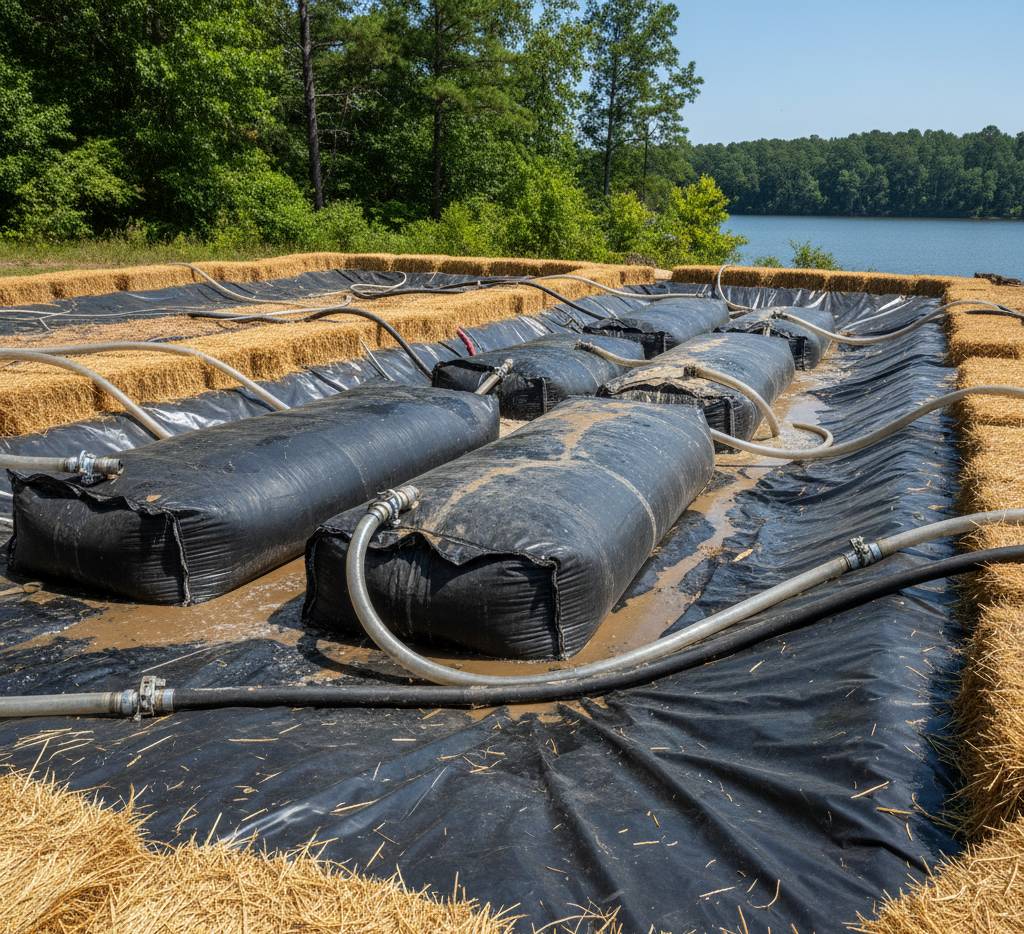
Comprehensive Sediment Management
Volume targets, dewatering pads/geotubes, beneficial reuse (berms/shoreline backfill), disposal logistics by basin (Neuse nutrient rules awareness)—full-cycle sediment management for North Carolina properties, aligning method to budget while maintaining NCDEQ compliance.
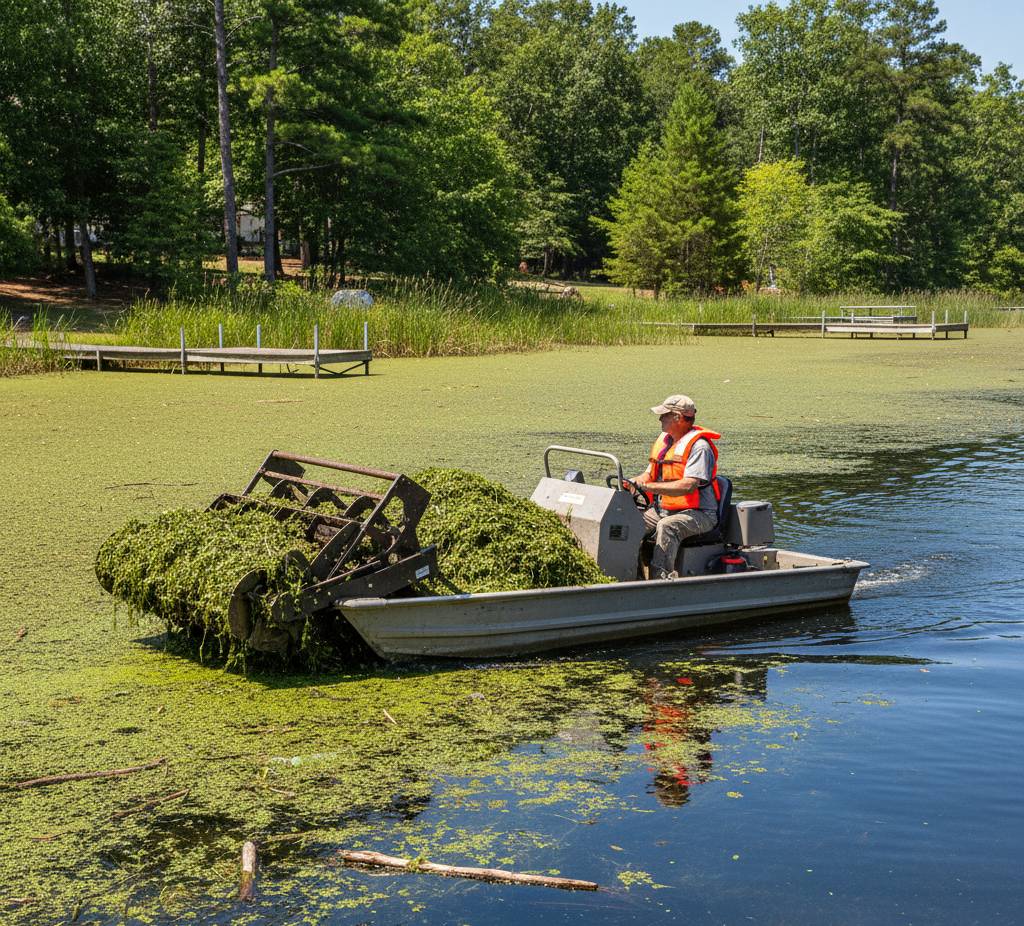
Aquatic Vegetation Management
Duckweed, watermeal, filamentous algae; regionally relevant invasives: hydrilla (noted in Norman/James/Coastal backwaters), alligator weed (coastal plain), elodea/eurasian watermilfoil presence in parts of NC—targeted removal to protect gains after lake dredging.
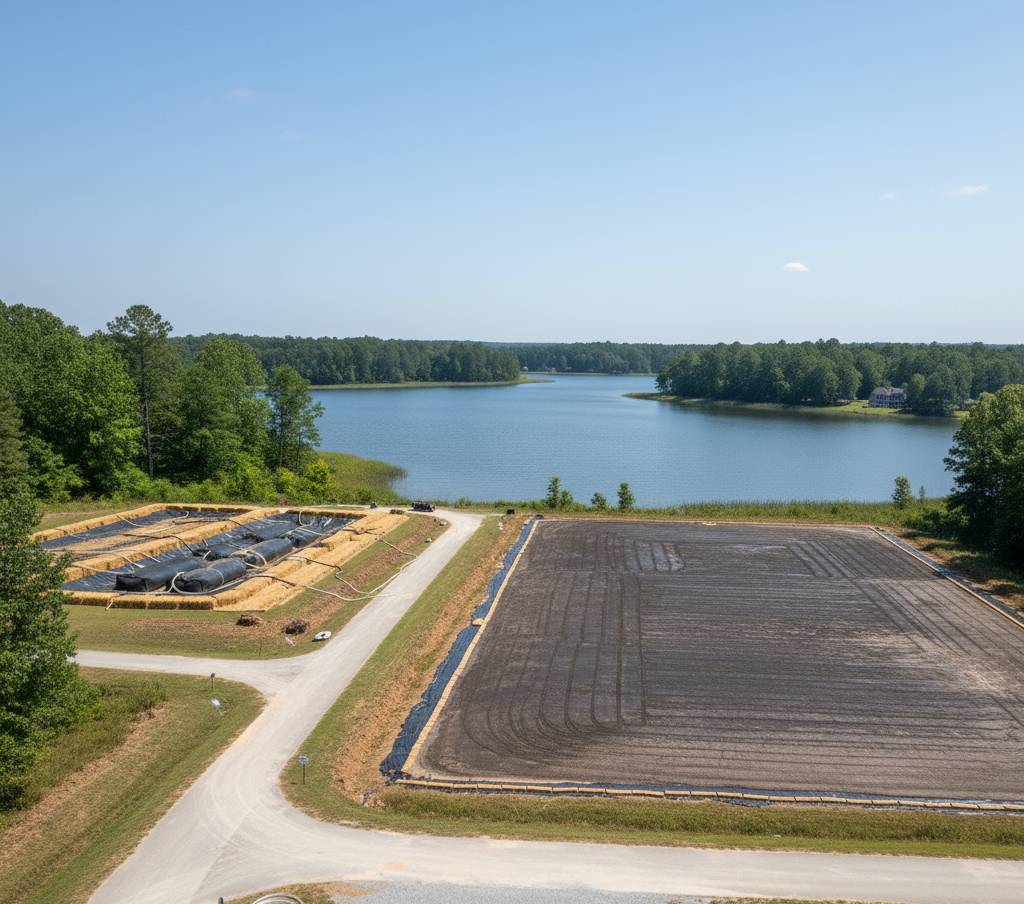
Sediment Dewatering Solutions
Geotextile tube fields in piedmont subdivisions; pad drying where space allows (High Rock/Tillery farm edges)—right-sized dewatering approaches for North Carolina sites that keep sludge removal, desilting, and export efficient.
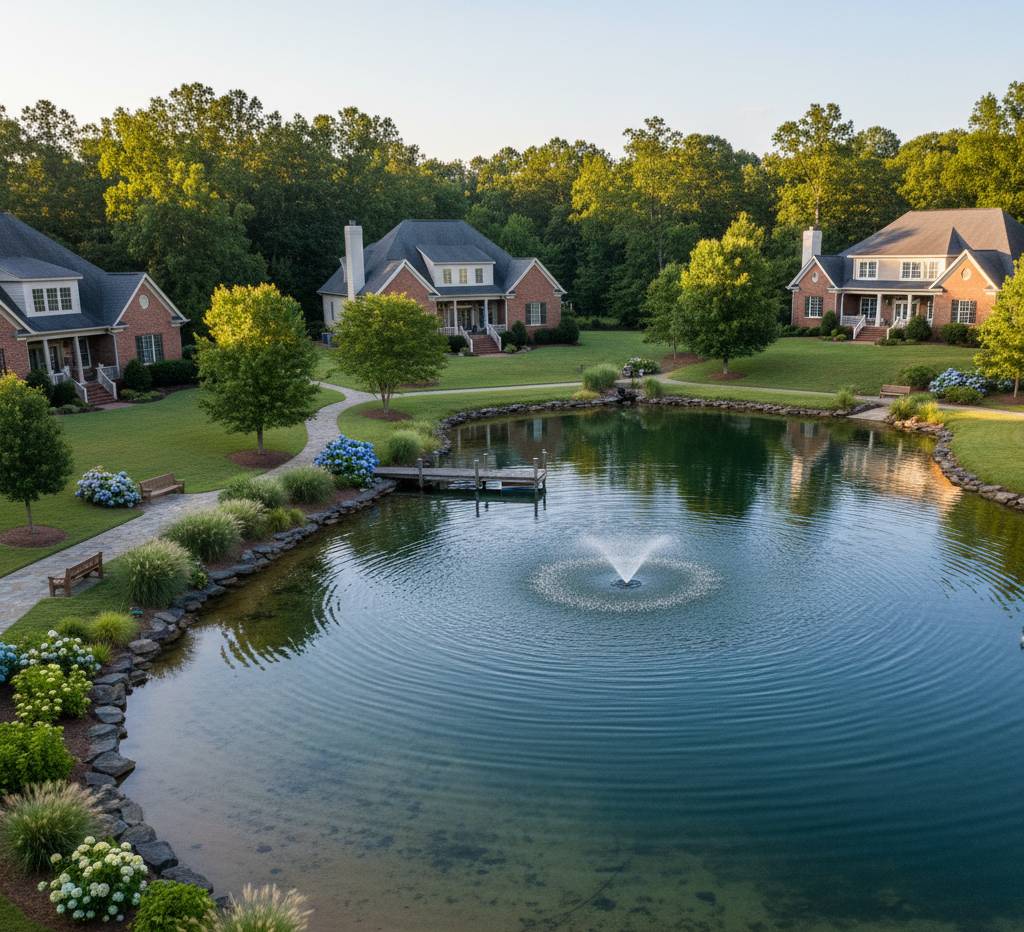
Continuous Lake Management
Inlet delta knockdowns after storm seasons; aeration/circulation on cul-de-sac coves; HOA seasonal checks—post-project lake maintenance for North Carolina properties, including hurricane/tropical rainfall recovery.
Ready to Restore Your Greensboro Lake or Cove?
Revive your Greensboro pond or lake for long-term health and usability—restore depth, flow, and shoreline conditions for your Greensboro waterway, improving water quality and extending the life of legacy lakes in the Yadkin–Pee Dee region with practical dredging solutions.
FAQ
Frequently Asked Questions About Dredging in Greensboro, North Carolina
What causes sediment buildup in ponds and lakes around Greensboro, North Carolina?
Sediment in Greensboro waterways comes from feeder creeks, farmland runoff, storm events, and organic decay—common in Yadkin–Pee Dee lakes and legacy ponds, leading to shallowing and reduced usability over time.
Can you dredge older ponds and legacy lakes that haven’t been maintained in decades?
Yes, we specialize in rehabilitating aging ponds and legacy lakes near Greensboro, using careful methods to remove decades of buildup while preserving structures and improving long-term health.
How does dredging benefit community and municipal lakes near Greensboro?
Dredging restores depth for fishing and recreation, enhances water quality, and supports public use in Greensboro's parks and municipal lakes—extending their lifespan and boosting community value.
Do you remove sediment deltas where feeder creeks enter ponds and lakes in Greensboro?
Absolutely—our targeted dredging clears inlet deltas and creek deposits in Greensboro waterways, preventing further siltation and restoring natural flow around Yadkin–Pee Dee region lakes.
Is dredging suitable for farm ponds or rural properties near Greensboro?
Yes, our flexible equipment handles rural access and farm ponds in Greensboro, removing sediment from agricultural runoff to improve irrigation, livestock watering, and pond functionality.
Will dredging help improve water clarity, fish habitat, and algae conditions in Greensboro?
Dredging reduces nutrient overload in Greensboro lakes, improving clarity, enhancing fish habitats, and controlling algae—leading to healthier ecosystems and better recreational fishing.
Can dredged material be reused on our property for shoreline or land improvement in Greensboro?
Often yes—after testing for contaminants, Yadkin–Pee Dee sediment can be reused for shoreline stabilization or land enhancement on Greensboro properties, reducing costs and supporting beneficial practices.
Serving North Carolina Lakes & Communities
We provide dedicated dredging services across North Carolina's major population centers, Duke Energy lakes, and private lakes from Charlotte to Wilmington.
Charlotte Metro & Union
Lake Norman + Lake Wylie + HOA lakes + rapid suburban growth sediment issues—all share similar lake systems (Catawba chain + foothill lakes), red clay runoff issues, and Duke Energy lake management rules.
Lake Norman & Foothills (I-77 / I-85 Belt)
Marina/shoreline + older lake houses on Catawba chain—speaking “Catawba chain” for urban/HOA vs marina/shoreline, with red clay runoff and Duke Energy rules.
Triangle Core (Raleigh–Durham–Chapel Hill & Wake/Johnston)
Suburban HOA lake clusters, stormwater-fed ponds, Neuse basin rules—same stormwater + HOA pond problem profile, same permitting & Neuse watershed nutrient context for Jordan/Falls/Harris narrative.
Triad & Northern Piedmont
High Rock/Badin/Tillery/Belews lake systems, older lakefront infrastructure, sediment from farmland + feeder streams—these lakes operate like one cultural & waterflow region with Yadkin–Pee Dee governing dredging, plus Triad suburbs share HOA lake/pond issues.
Inner Banks & Coastal Plain (Tar–Pamlico / Neuse)
Tar–Pamlico/Neuse sediment and low-slope dewatering talking points—coastal plain fine silt, tidal influences, and nutrient rules awareness.
Cape Fear & Crystal Coast and High Country
“Edge territories” — outside the Piedmont, special-case dredging (tidal or steep access)—coastal/tidal bids + storm sediment + marsh; mountains = steep grade + tight coves + limited lake access (aim “steep access, narrow coves, mountain spoils”).
Inquire about availability for special projects outside these core North Carolina areas (including neighboring states in the Southeast).